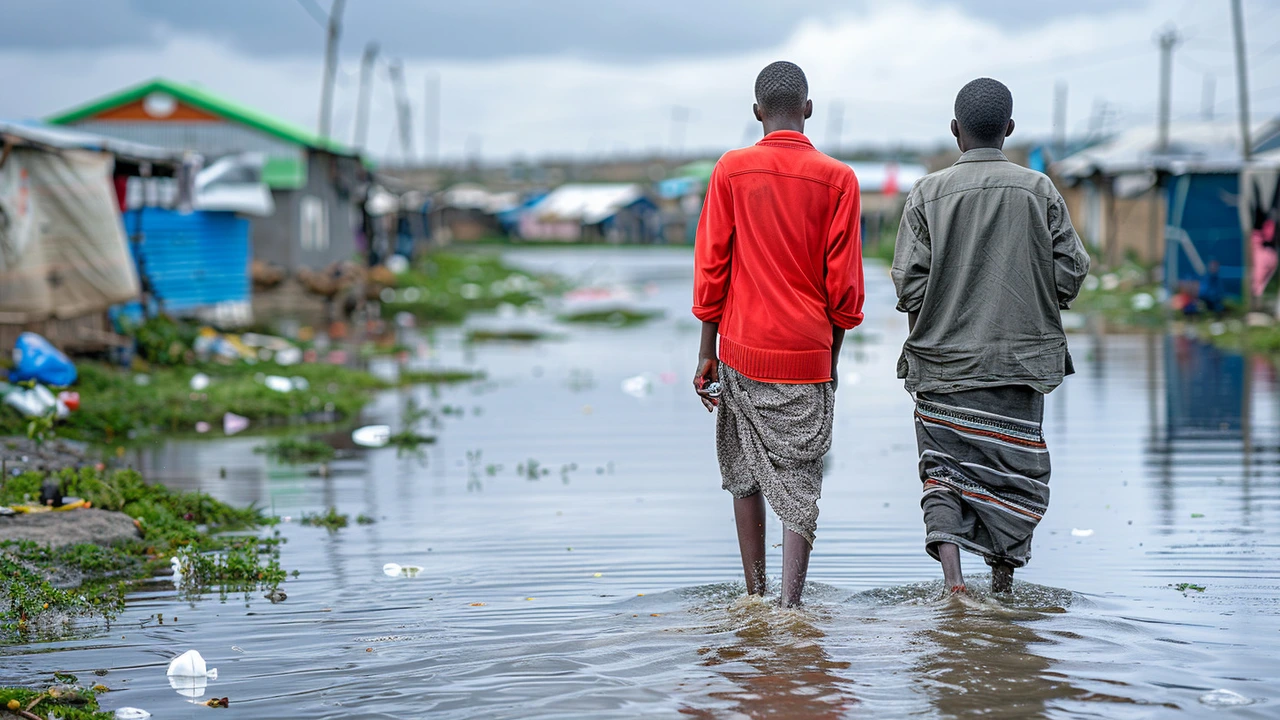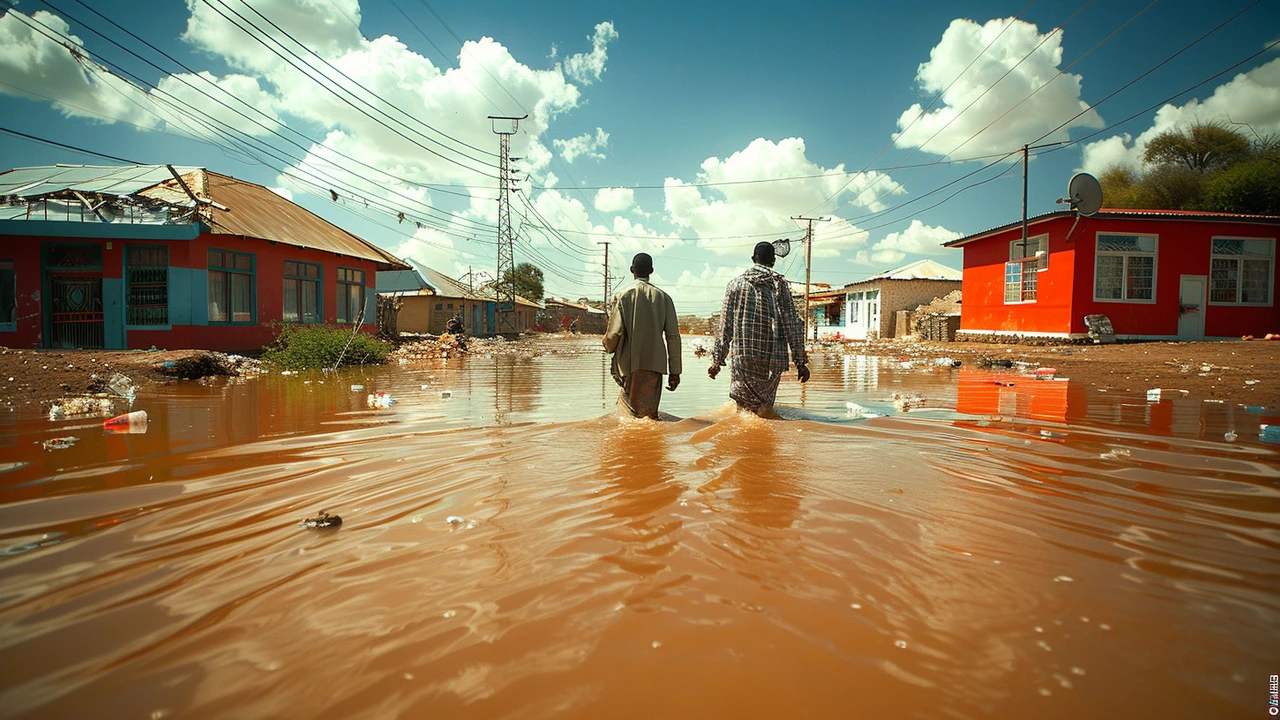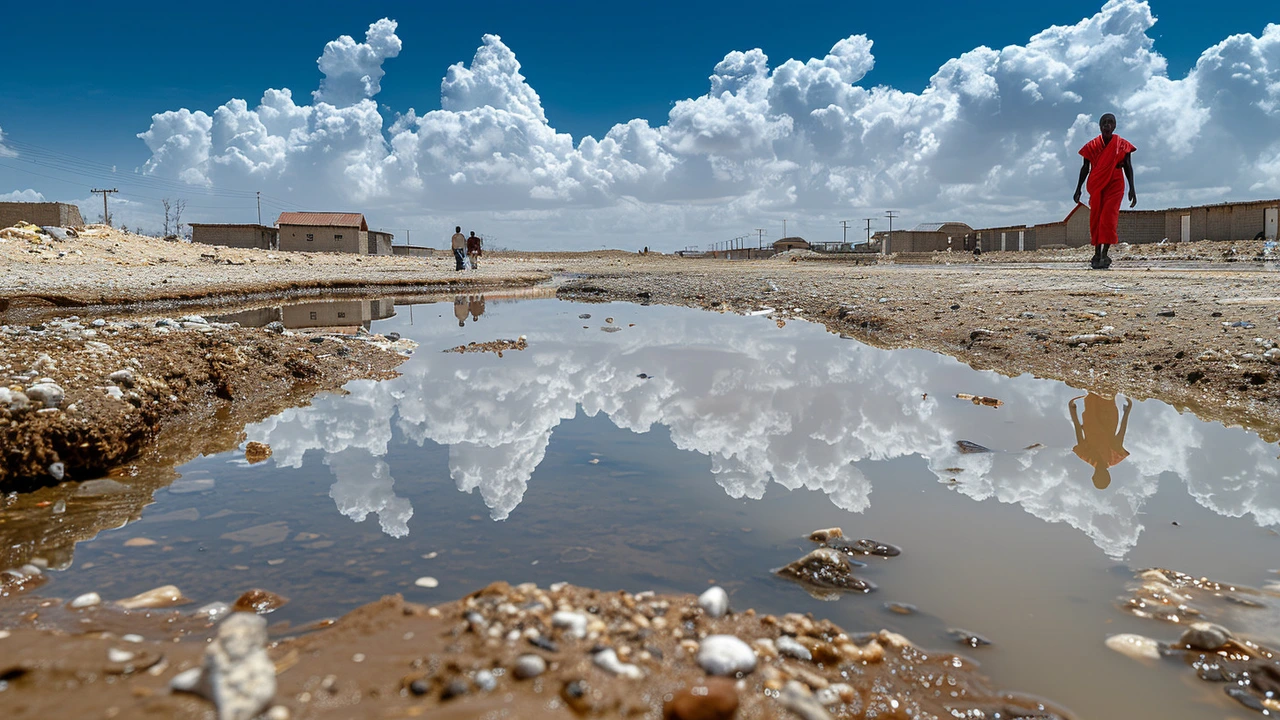Humanitarian Crisis in Somalia's Afmadow District: Flooding, Insecurity, and Limited Access to Basic Needs Worsen Conditions

The Lingering Impacts of Deyr Flooding
The humanitarian situation in Afmadow district, Somalia, has reached a critical point as of March 2024. The aftermath of the Deyr season flooding, which struck the region in the latter part of 2023, continues to affect the lives of residents. The continuous flood waters have devastated the infrastructure, leaving roads impassable and disrupting the daily lives of the inhabitants. Flooding has left homes damaged beyond repair and farmlands submerged, resulting in substantial crop losses. With agriculture being a primary source of livelihood, the destruction of crops has had a ripple effect, leading to food insecurity and economic hardship for many households. The resulting shortage has driven food prices upwards, making basic necessities unaffordable for a significant portion of the population.
Compounding the problems caused by flooding, the persistent security issues in the region have further complicated the humanitarian landscape in Afmadow district. The area remains volatile, with sporadic outbreaks of violence and clashes between armed groups. This has severely restricted movements, hindering aid distribution and disrupting trade routes. The pervasive insecurity has instilled fear among residents, making it difficult for them to venture outside for essential activities. For those who want to relocate to safer areas, the lingering violence presents a significant barrier.
Insecurity and Its Effects on Vulnerable Groups
One of the most pressing concerns is the plight of vulnerable groups within the district, including the elderly and people with disabilities. These individuals are particularly at risk, as their mobility limitations make it difficult for them to escape dangerous situations. They are often left behind, stuck in their homes with limited access to aid and services. The isolation of these groups exacerbates their vulnerability, leaving them dependent on community support, which is itself stretched thin due to the widespread hardship.
Healthcare services, which were already inadequate before the crises, are now under severe strain. Many healthcare facilities were damaged by the floods, and ongoing insecurity has made it challenging to rebuild and replenish supplies. Consequently, accessing medical care has become a significant challenge for the residents. For those with chronic health conditions or needing immediate medical assistance, the lack of accessible healthcare can have life-threatening consequences.

Water and Sanitation Crisis
Another significant issue is the limited access to clean drinking water and improved sanitation facilities. The floodwaters have contaminated many water sources, resulting in a shortage of potable water. The scarcity of clean drinking water elevates the risk of waterborne diseases such as cholera, which can spread rapidly in such unsanitary conditions. In addition to water contamination, the destruction of sanitation facilities exacerbates the public health risks. With improper waste disposal and lack of hygiene products, the district is on the brink of a severe public health crisis.
Efforts to address these issues are hindered by the compounded challenges of limited resources, insecurity, and difficult terrain. Despite the efforts of humanitarian organizations, access to the affected areas remains sporadic and dangerous. This intermittent access hampers effective aid delivery and delays the support desperately needed by the residents of Afmadow district.
Food Insecurity and Short-Term Coping Strategies
The combination of crop losses, rising food prices, and lack of employment opportunities has forced many households to adopt short-term coping strategies. These strategies, while essential for immediate survival, often have detrimental longer-term effects. Many families have resorted to relying on less nutritious food options, reducing the frequency of meals, and selling valuable assets to make ends meet. While these measures may provide temporary relief, they worsen the overall vulnerability of households, eroding their resilience to future shocks and stresses.
The price surge in food items has hit the poorest households hardest, plunging them further into poverty. The lack of financial stability has increased dependency on humanitarian assistance, which is itself inconsistent due to the multiple barriers faced by aid workers in reaching the district.

Need for Immediate and Effective Interventions
The current situation in Afmadow district calls for immediate and collaborative efforts to alleviate the humanitarian crisis. Effective interventions must prioritize the restoration of clean water sources, sanitation facilities, and healthcare services. Humanitarian agencies and local authorities need to work together to establish secure and reliable channels for aid distribution, ensuring that the most vulnerable groups receive the support they need. There must also be a long-term focus on rebuilding infrastructure, agricultural support, and economic opportunities to restore self-sufficiency among residents.
Community-based support systems can play a crucial role in providing immediate assistance while strengthening local resilience. Training and resources should be provided to help communities manage and mitigate the impacts of future disasters. International support, both in terms of funding and expertise, is critical in addressing the multifaceted challenges faced by Afmadow district.
In conclusion, the humanitarian crisis in Afmadow district requires a multifaceted and sustained response to meet both immediate needs and long-term recovery. Addressing the combined effects of flooding, insecurity, and lack of basic necessities is essential for improving the living conditions of the residents and building a more resilient community capable of withstanding future challenges.






joy mukherjee
May 30, 2024 AT 20:23My heart goes out to every family stuck in Afmadow – the floods have ripped apart homes, fields, and hopes 😢. It's hard enough dealing with loss, and on top of that the constant threat of violence makes it feel unbearable. I hope NGOs can find safer corridors, and that locals get the clean water they desperately need. Sending love and strength to everyone there, you are not invisible. Stay hopeful 🙏.
Rob Chapman
June 2, 2024 AT 05:46The floods really shake how we see resilience
Delaney Lynch
June 4, 2024 AT 14:43The situation in Afmadow is a stark reminder of how climate shocks cascade into humanitarian catastrophes, when one disaster strikes, it pulls the rug out from underneath every safety net that communities have tried to build, the lingering floodwaters have not only destroyed crops but also turned once‑fertile fields into stagnant, disease‑breeding pools, this in turn fuels a surge in waterborne illnesses, adding a silent, invisible layer of suffering to an already dire picture, meanwhile, the relentless insecurity means that aid convoys are forced to navigate dangerous routes, often arriving late or not at all, the elderly and persons with disabilities are left stranded, watching the world move on while they wait for a lifeline, health facilities, already fragile, now lack both basic supplies and functional infrastructure, forcing families to travel miles for a single dose of medication, the price of staple foods has skyrocketed, pushing many households into a brutal choice between food and medicine, yet, within this darkness, there are glimmers of community resilience, as neighbors share what little they have, and local leaders organize makeshift shelters, these grassroots efforts, however, need the backing of well‑coordinated international assistance to scale up, water purification units, mobile clinics, and secure distribution points could dramatically cut the risk of cholera and other outbreaks, rebuilding roads and bridges must be a priority, not just for aid delivery but for reconnecting families torn apart by conflict, long‑term agricultural support, such as drought‑resistant seeds and irrigation schemes, will help restore livelihoods once the floodwaters recede, we must also invest in peacebuilding measures, because without security, any humanitarian effort will be a temporary Band‑Aid, in short, a coordinated, multi‑sector response-combining health, water, nutrition, infrastructure, and peace initiatives-is the only path to a sustainable recovery.
Nicholas Mangraviti
June 6, 2024 AT 23:40We need clear, safe corridors for aid. Communities can’t wait forever.
Jared Greenwood
June 9, 2024 AT 08:36It’s infuriating to watch endless bureaucratic red‑tape choke life‑saving aid – the whole operation suffers from a systemic failure of strategic logistics, a classic case of mission‑critical resources being throttled by indecisive policy. If we truly want to counter the destabilizing insurgent narratives, we must deploy hard‑line, high‑tempo supply chains, leveraging joint‑task force capabilities, and stop coddling the status‑quo. The jargon isn’t just fluff; it’s a call to arms for a coordinated, nation‑first response, and any half‑hearted effort is unacceptable.
Sally Sparrow
June 11, 2024 AT 17:33This whole narrative reads like a textbook case of misguided aid dependency, where NGOs parade their benevolence while ignoring the root causes of chronic underdevelopment. The victims are portrayed as perpetual victims, never given agency, and the security vacuum is conveniently blamed on “sporadic violence” instead of the systemic governance failures. It’s high time we stop this paternalistic charity and demand accountability from the very actors who perpetuate the cycle of crises.
Eric Yee
June 14, 2024 AT 02:30Looks like the flood and the gunfire are doing a nasty duet over there, not a great show for anyone but the locals. Still, some crews manage to slip through, drop off a few bottles and medkits – small wins, but they matter.
Sohila Sandher
June 16, 2024 AT 11:26Hey team, you’re doing amazing work even when the odds feel like a mountain. Keep pushing, every drop of water you bring back, every smile you share, makes a huge diffrence. Remember to take care of yourselves too, you cant pour from an empty cup. Stay strong and keep that fire burning!
Anthony Morgano
June 18, 2024 AT 20:23Wow, reading about Afmadow really hits home – it’s crazy how quickly things can go from normal to chaos, huh? 😲 Let’s hope more resources flow in, and maybe we can learn some lessons about disaster prep for future storms 😊.